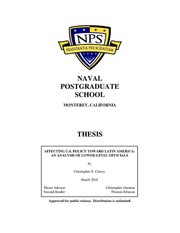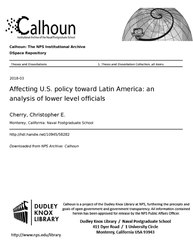File:Affecting U.S. policy toward Latin America- an analysis of lower level officials (IA affectinguspolic1094558282).pdf

Original file (1,275 × 1,650 pixels, file size: 1.02 MB, MIME type: application/pdf, 102 pages)
Captions
Captions
Summary[edit]
| Affecting U.S. policy toward Latin America: an analysis of lower level officials
( |
||
|---|---|---|
| Author |
Cherry, Christopher E. |
|
| Title |
Affecting U.S. policy toward Latin America: an analysis of lower level officials |
|
| Publisher |
Monterey, California: Naval Postgraduate School |
|
| Description |
In this paper, I examined U.S. foreign policy toward Latin America, primarily during the Cold War. I sought to answer the following questions: (1) What factors influenced the behavior of lower-level U.S. officials stationed in Latin America at the time? and (2) How much policy-affecting agency did these officials have? Using primary source documentation contained in the State Department’s Foreign Relations of the United States (FRUS) volumes to the maximum extent possible, I examined the following case studies: Guatemala circa 1954, Costa Rica circa 1948, and lastly, present-day Bolivia. In my research and analysis, I shed light on the dynamic that existed between Washington policymakers and lower-level officials stationed in-region, mainly ambassadors. My analysis resulted in the following conclusions: (1) anti-communist Cold War hysteria clouded the judgment of lower-level officials, (2) pressure from Washington elites largely influenced the behavior of these officials, and (3) U.S. officials stationed in-region had relatively little policy-affecting agency. Ultimately, I make a case for a U.S. foreign policy apparatus that empowers lower-level officials stationed in-region. This arrangement will prove most effective in observing, analyzing, and appreciating the nuances present in foreign countries, which would result in a flexible and tailored U.S. foreign policy. Subjects: U.S. foreign policy; international relations; Cold War; Latin America; Guatemala; Costa Rica; Bolivia |
|
| Language | English | |
| Publication date | March 2018 | |
| Current location |
IA Collections: navalpostgraduateschoollibrary; fedlink |
|
| Accession number |
affectinguspolic1094558282 |
|
| Source | ||
| Permission (Reusing this file) |
This publication is a work of the U.S. Government as defined in Title 17, United States Code, Section 101. Copyright protection is not available for this work in the United States. | |
Licensing[edit]
| Public domainPublic domainfalsefalse |
This work is in the public domain in the United States because it is a work prepared by an officer or employee of the United States Government as part of that person’s official duties under the terms of Title 17, Chapter 1, Section 105 of the US Code.
Note: This only applies to original works of the Federal Government and not to the work of any individual U.S. state, territory, commonwealth, county, municipality, or any other subdivision. This template also does not apply to postage stamp designs published by the United States Postal Service since 1978. (See § 313.6(C)(1) of Compendium of U.S. Copyright Office Practices). It also does not apply to certain US coins; see The US Mint Terms of Use.
|
 | |
| This file has been identified as being free of known restrictions under copyright law, including all related and neighboring rights. | ||
https://creativecommons.org/publicdomain/mark/1.0/PDMCreative Commons Public Domain Mark 1.0falsefalse
File history
Click on a date/time to view the file as it appeared at that time.
| Date/Time | Thumbnail | Dimensions | User | Comment | |
|---|---|---|---|---|---|
| current | 01:32, 14 July 2020 |  | 1,275 × 1,650, 102 pages (1.02 MB) | Fæ (talk | contribs) | FEDLINK - United States Federal Collection affectinguspolic1094558282 (User talk:Fæ/IA books#Fork8) (batch 1993-2020 #5683) |
You cannot overwrite this file.
File usage on Commons
The following page uses this file:
Metadata
This file contains additional information such as Exif metadata which may have been added by the digital camera, scanner, or software program used to create or digitize it. If the file has been modified from its original state, some details such as the timestamp may not fully reflect those of the original file. The timestamp is only as accurate as the clock in the camera, and it may be completely wrong.
| Short title | Affecting U.S. policy toward Latin America: an analysis of lower level officials |
|---|---|
| Author | Cherry, Christopher E. |
| Date and time of digitizing | 06:09, 27 March 2018 |
| Software used | Microsoft® Word 2016 |
| File change date and time | 02:09, 20 April 2018 |
| Date metadata was last modified | 02:09, 20 April 2018 |
| Conversion program | Microsoft® Word 2016 |
| Encrypted | no |
| Page size | 612 x 792 pts (letter) |
| Version of PDF format | 1.4 |

